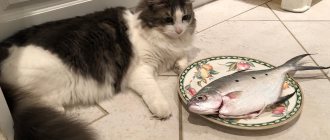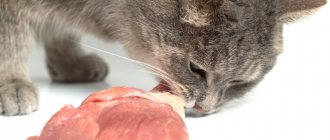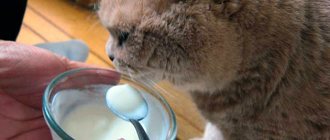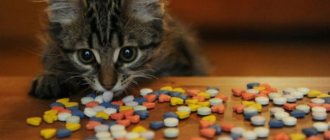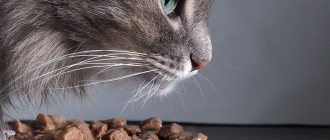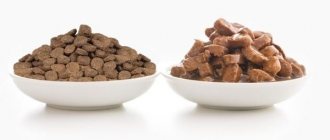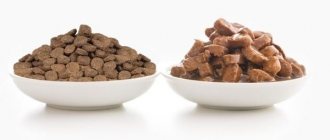Veterinarians believe that chicken meat is a healthy product for cats due to its high protein content, micro- and macroelements. The pet's diet should also contain by-products - kidneys, liver, hearts and stomach. Poultry is the healthiest because it does not contain antibiotics or salt, which is used to artificially increase weight.
About the benefits of chicken meat
It's no secret that chicken meat is considered dietary. It is easily absorbed by the body, so even people weakened after surgery are recommended to first eat nutritious chicken broth, then add white chicken breast meat to the diet.
The big advantage is that chicken meat is inexpensive and cooks quickly. The product contains a large amount of easily digestible protein, and the tender consistency of the meat is liked not only by people, but also by pets. It is provided by a minimal amount of connective tissue. The digestibility of chicken meat is 90%.
Chicken has two types of meat: white and red. Chicken breast meat is commonly called white. It contains less fat and more protein, and is considered dietary because it is low in calories (about 110 kcal per 100 g of product). But veterinarians do not recommend feeding your cat only white meat. Yes, it contains more magnesium, but red contains no less important microelements - iron and zinc, as well as vitamins.
Chicken meat contains vitamins necessary for any living organism, including A, group B (B1, B2, B4, B5, B6, B9 and B12), C, D, E, K, PP. In addition, chicken contains:
- calcium;
- magnesium;
- phosphorus;
- potassium;
- sodium;
- iron and other trace elements.
The rich composition of nutrients allows veterinarians to recommend feeding domestic cats chicken meat - not only the breast, but also other parts of the carcass. However, it is strictly forbidden to give skins and long bones to your cat. Leather is poorly digested in the stomach of pets; moreover, it contains a lot of fat and, if eaten regularly, even in the healthiest cats, will eventually cause problems with the liver, pancreas, and gall bladder. When chewed, tubular bones break into sharp fragments. They can injure the intestines, so they are prohibited for cats.
In what form can cats be given meat, offal, eggs?
Not all types of meat are good for cats. Experts recommend feeding the animal chicken, turkey, lean parts of beef and lamb, rabbit, and veal. Pork, duck, goose, and excessively fatty meat are contraindicated for cats. It is advisable to buy products from trusted places, and be sure to ask for veterinary reports (without them, meat cannot be sold at all).
After purchasing, it is recommended to place it in the freezer for several days. Before feeding, scald with boiling water or cook a little.
The diet should also contain by-products. The most beneficial food for cats is liver. Unlike meat, it is recommended to give offal to your pet boiled. Chicken or beef liver should be boiled or well frozen, and scalded with boiling water before feeding. The first option is preferable, since the liver may contain helminth eggs and many harmful substances. Raw offal can also cause indigestion in cats, such as constipation or diarrhea.
Should I give raw or boiled meat?
Cats are carnivores, and in the wild no one cooks food for them, so the digestive system of pets can handle raw meat quite well. Therefore, such food is physiologically closer to cats. Another thing is the individual preferences of animals, which depend on what food the animal has been accustomed to since childhood.
Chicken meat is extremely rarely infected with helminths, so in this regard, a cat eating raw chicken is not in danger. Fish and other types of meat pose a great danger - for example, pork, which veterinarians generally do not recommend giving to cats.
Much more dangerous is the possible infection of a pet with salmonellosis. The causative agents of the disease are Salmonella - bacteria that remain active for a long time and are practically insensitive to low temperatures. But at +75 degrees, pathogenic microorganisms die. A 10-minute heat treatment will be enough to kill germs. A side effect of this treatment is that some of the nutrients are lost. The conclusion suggests itself: cats can have raw chicken meat, but only if it is purchased from a trusted seller and has been tested for salmonella.
Why is salmonellosis dangerous?
Salmonellosis is dangerous not only for cats, but also for humans. And more than a third of domestic animals with strong immunity that have eaten meat contaminated with salmonella will forever remain carriers of the pathology. The weakened body of a cat (small kittens, elderly animals) may not be able to cope with the infection.
The disease is always severe and accompanied by severe symptoms. You can observe in your pet:
- refusal of food;
- attacks of high fever;
- increased body temperature;
- apathy;
- diarrhea, feces have a dark, almost black color and a foul odor, and may contain streaks of blood;
- frequent vomiting with foam;
- cough;
- labored breathing.
The cat may experience severe pain in the abdomen, does not allow it to be touched, and shows aggression. With salmonellosis, the permeability of the vascular walls increases, which accelerates the penetration of pathogenic microorganisms into the body. Without prompt veterinary care, kittens, animals with low immunity and elderly animals die within 1-2 days from dehydration or sepsis.
Possible problems
Sometimes kittens have problems when feeding meat. Let's list the most typical ones.
Kitten vomits raw meat
If a kitten vomits raw meat, then most likely he ate too much at one time. Some kittens do not know how to control their eating behavior, attacking food like crazy and eating everything they see. Such kittens should be limited by giving food in strictly measured portions. Even if it seemed to you that the kitten vomited after eating a small amount of meat, perhaps you were just measuring by eye and that’s why its portion seemed small. So use a kitchen scale.
Also, the cause of regurgitation may be intolerance to any type of meat. Pay attention to what exactly the kitten regurgitates. If it is always the same type of meat, you will have to give it up.
In addition, regurgitation of hard food such as gizzards or bones may occur.
In addition, if the kitten is 2-3 months old or more, and he is accustomed only to industrial food, problems associated with enzyme deficiency may arise with the consumption of meat.
EXPERT COMMENT: CANDIDATE OF BIOLOGICAL SCIENCES GALINA CHILIKINA
“Any dry food is granules that have a porous structure and contain almost digested food, so enzymes are not required to digest dry food. Entering the stomach through the esophagus, these granules begin to absorb gastric juice, under the influence of which they turn into a homogeneous liquid gruel, which in turn enters the small intestine, where absorption occurs. The movement of this liquid gruel from the stomach into the intestines occurs almost by gravity, so contraction of the walls of the stomach and intestines is not required. Therefore, the motility of the gastrointestinal tract in cats eating exclusively dry food is very sluggish. Thus, dry industrial food takes over the functions of the body, and this leads to the fact that the cat does not produce enzymes intended for breaking down and digesting natural food.”
Kitten eats only meat
This is normal, no need to worry. The kitten is a predator, it is supposed to eat meat. All other products (fermented milk, fish, vegetables, eggs) are food additives that may not be in the diet. And even more so, do not feed kittens cereals that are harmful to them.
Kitten doesn't want to eat meat
But this situation, on the contrary, requires careful study. All kittens, when they reach the age of 1 month, are already able to absorb some amount of meat. After all, at 2 months they will have to wean themselves from their mother’s breast and eat on their own. If a very small kitten refuses meat, then it is simply too early for him to eat it. If we are talking about a 2-month-old kitten, then it needs to be examined. Typically, this behavior is associated with gastrointestinal pathologies.
Some cats refuse to eat meat if they have been taught to eat dry food. Adult cats can sometimes be very difficult to retrain. But with kittens that previously ate dry food, as a rule, there are no problems when switching to meat. Kittens are open to everything new and it is quite simple to form in them the food preferences needed by the owner.
Is it possible to give heads and paws
Chicken can be the basis of your pet's diet, but you should not feed it chicken breast alone. Already from 3.5-4 months of age, kittens can be given chicken legs, and by about a year - and heads by removing the beak.
Benefits of chicken heads:
- scallops and eyes contain collagen, a component of protein;
- the brain is a source of fat and B vitamins;
- The soft bones of the head ensure the supply of calcium to the cat’s body.
Cats need bones because they are a good source of calcium and phosphorus. By chewing chicken heads, the cat trains its chewing muscles and strengthens its gums.
Important!
It is not recommended to give boiled bones to cats - they clog the animal's digestive tract.
It is recommended to give chicken heads to kittens - during the growth period they need to ensure that their body receives a sufficient amount of protein, fats, and beneficial microelements. Pregnant and lactating cats will benefit from calcium and phosphorus, contained in sufficient quantities in chicken heads.
However, they should be given to pets carefully - no more than one head per meal. Overeating can lead to problems with the digestive system. In addition to heads, you can give cats chicken by-products: liver, kidneys, lungs, hearts.
Important!
Cats usually love liver, but it is best to give it no more than once a week. More frequent consumption of liver negatively affects the appearance of the animal and the quality of the coat.
Kittens and adult cats, as a rule, are reluctant to eat other offal products. Therefore, they are rarely included in the diet of pets. If the cat does not refuse such food, you can give him chicken hearts instead of meat once a week.
Mr. Cat recommends: precautions
Veterinarians recommend checking any domestic cat for parasites from time to time. For prevention, it is necessary to take a course of anthelmintic drugs. The frequency of courses is two or three times a year. This is especially necessary for cats that are fed natural food. This is due to the fact that there are no methods of processing meat at home that will completely disinfect it and protect the cat from parasites.
In addition, you should know that a pet can become infected with helminthiasis in various ways, not only through eating raw meat.
Often, owners feed their pets both raw and cooked meat. This can be done, but you need to give the product with different degrees of processing at different times. The fact is that to digest raw, half-raw and cooked meat, enzymes with varying degrees of activity are produced. They cannot be produced in the body at the same time, so after feeding your pet raw meat, the boiled product can be given no earlier than three hours later.
Chicken for kittens as a permanent food
To the question “Is it possible to feed chicken meat to kittens all the time?” Experts give mixed answers. But they adhere to the fact that in the first three months of life the diet should remain unchanged. Other products are added gradually and in small portions, but chicken meat must be present. You can replace it when the kitten grows up and adapts to heavier products.
Boiled or raw chicken meat is good for kittens for complete nutrition. It is cheap, accessible and easy to digest. If you follow all the rules, your pet will be happy with this dish and will grow up healthy and happy.


